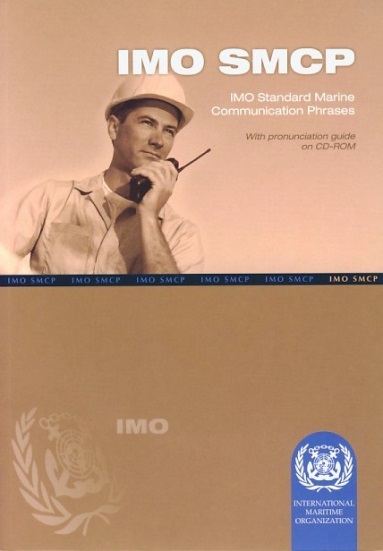
- •Sea Practice Report
- •6.Deck Cadet Duties
- •7.Duties of an oow
- •8.Boat Safety Drills
- •1.Port Description
- •2. Bridge Equipment
- •3 . Cargo operations
- •4. Shipping Documents
- •5. Watchstanding
- •6.Deck Cadet Duties
- •Maintenance and Safety
- •Navigation
- •Port Work
- •Nautical Preparations
- •Records
- •7.Duties of an oow
- •Navigation
- •Watchkeeping
- •Operations of the Ship
- •Emergency Response
- •8.Boat Safety Drills
- •Abandon Ship
- •Man Overboard
- •9. Imo Standard Marine Communication Phrases
- •10. Ship Correspondence
9. Imo Standard Marine Communication Phrases
I MO's
Standard Marine Communication Phrases (SMCP) were adopted by the 22nd
Assembly in November 2001 as resolution A.918(22) IMO Standard Marine
Communication Phrases.
MO's
Standard Marine Communication Phrases (SMCP) were adopted by the 22nd
Assembly in November 2001 as resolution A.918(22) IMO Standard Marine
Communication Phrases.
The resolution adopts the Standard Marine Communication Phrases (SMCP) and recommends a wide circulation to all prospective users and all maritime education authorities.
The IMO SMCP replace the Standard Marine Navigational Vocabulary (SMNV) adopted by IMO in 1977 (and amended in 1985).
The SMNV was developed for use by seafarers, following agreement that a common language - namely English - should be established for navigational purposes where language difficulties arise and the IMO SMCP has been developed as a more comprehensive standardized safety language, taking into account changing conditions in modern seafaring and covering all major safety-related verbal communication.
The IMO SMCP includes phrases which have been developed to cover the most important safety-related fields of verbal shore-to-ship (and vice-versa), ship-to-ship and on-board communications. The aim is to get round the problem of language barriers at sea and avoid misunderstandings which can cause accidents.
The IMO SMCP builds on a basic knowledge of English and has been drafted in a simplified version of maritime English. It includes phrases for use in routine situations such as berthing as well as standard phrases and responses for use in emergency situations.
Under the International Convention on Standards of Training, Certification and Watchkeeping for Seafarers (STCW), 1978, as amended, the ability to understand and use the SMCP is required for the certification of officers in charge of a navigational watch on ships of 500 gross tonnage or above.
10. Ship Correspondence
In foreign ports the ship's administration has to contact many official organizations and persons in order to secure normal work of the ship. Apart from numerous business talks, the ship's officers often have to exchange official letters with shore organizations, especially with the ship's agent.
First of all, in accordance with Charter Party terms, the ship is to send notices of readiness to load or discharge the cargo. This should be done immediately on arrival at the port. Usually a notice of readiness contains the following information: the name of the ship, time of arrival, the number of berth at which the ship is moored, description and quantity of cargo, time of the beginning and expiring of laydays.
As a rule, notices of readiness are sent to shippers or consignees through the ship’s agents. Notices of readiness are important formal documents, because the laytime begins to count some hours later from the moment when the notice has been accepted. As stated in Charter Party, lay days shall commence at 1 p. m. if notice is accepted before noon. Lay days will commence at 8 a. m. next working day, if notice is accepted during office hours after noon.
Official invitation of a surveyor or of a representative of some repair shop to come aboard the ship is also written as a formal letter. Receipts for money or other valuable things received aboard should be also written in a formal way. It should be noted, that all the letters which are sent by a ship shall be signed by the master of that ship.
Ships may need bunker, fresh water, technical supplies and provisions when in foreign port. In a conversation with the agent all the details of buying these things can be cleared and agreed upon. But when ordering these goods official letters should be written to avoid any misunderstanding in future. In such letters the following details should be stated: correct description of the goods, exact quantity of them, the time when the goods should be delivered to the ship. Very often reference is made as to the price at which the captain wants to buy the goods. In ordering technical supplies due attention should be paid to exact characteristic and dimensions of the things you want to buy. For example, when ordering even such ordinary things asbrushes you should state whether you require round or flat brushes of 2" or 4" in size.
Official letters should also be sent when you want some person or organization to do something for your ship. This may be the case, for instance, when you want your agent to pay some expenses or to do some work for your ship.
Extra-weights, as a rule, are loaded and discharged by shore or floating cranes. Due arrangements should be made in this case with shippers or receivers of the cargo. Formal exchange of letters in this case is important not only because the work is connected with expenses and safe handling of the cargo. It is also important because it is connected with effective use of laytime.
If freight is not paid in time the ship has to detain some cargo, or, as it isjuridically called, "to exercise a lien upon the goods". The Master's actions in such a case should be accompanied by exchange of official letters.
